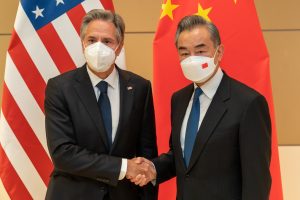Chinese Foreign Minister Wang Yi and U.S. Secretary of State Antony Blinken talked on the phone on Monday. It was their first conversation – and the first high-level China-U.S. exchange – since the 20th National Congress of the Chinese Communist Party (CCP) concluded on October 22.
At the party meeting, Wang was elevated to the party’s Politburo. That indicates he is to replace outgoing Yang Jiechi as China’s top diplomat – formally, the director of the Office of the Central Commission for Foreign Affairs, the CCP’s foreign policy body. Wang will move out of his foreign minister post along with the promotion.
The U.S. readout mentioned three topics of discussion: “the need to maintain open lines of communication and responsibly manage the U.S.-PRC relationship”; “Russia’s war against Ukraine and the threats it poses to global security and economic stability”; and “the deteriorating humanitarian and security situation in Haiti and the need for continued coordinated action in support of the Haitian people.”
The inclusion of the latter point suggests that the U.S. State Department is casting around for relatively neutral ground to foster China-U.S. cooperation. As the Associated Press has reported, Haiti is facing a multifaceted crisis involving both a deadly cholera epidemic and violent attacks by armed gangs.
China, for its part, made no mention of Haiti in its summary of the call. China’s Foreign Ministry did acknowledge the two diplomats discussed Ukraine, with Wang repeating China’s calls for all parties to “exercise restraint” and “increase diplomatic efforts” to prevent the situation from escalating.
Discussion of Ukraine was the very last thing in the Chinese readout. Instead, it led off by citing Blinken saying that the United States “paid close attention” to the 20th Party Congress. That set up a summary of Wang pontificating about the significance of the event. The Chinese foreign minister even gave his counterpart some homework: “If the U.S. side really wants to understand China, then please earnestly study the work report of the 20th Party Congress. China’s domestic and foreign policies are open and transparent, its strategic intentions are straightforward.” (If Blinken doesn’t have time to read the full report, he can start with my summary for The Diplomat.)
Wang reiterated the message from the 20th Party Congress that China will stick to its foreign policy objectives of “maintaining world peace and promoting common development.” But the biggest message the U.S. should take from the 20th Party Congress is that China is going to stick to its political and economic system. “The major policy direction of China’s party and government will maintain a high degree of continuity and stability,” Wang said. In other words: the U.S. must learn to live with China as it is.
Three days prior, Wang had conveyed the same message to U.S. Ambassador to China Nicholas Burns*: “As two great powers, China and the United States cannot change each other. The United States should not keep trying to deal with China from a position of strength and should not always think about suppressing and containing China’s development.” The “position of strength” comment is a reference to a 2021 quote from U.S. National Security Advisor Jake Sullivan that sparked China’s ire – and repeated remonstrations in the year and a half since.
In his call with Blinken, Wang reiterated that returning China-U.S. relations to a “stable development trajectory” is in both countries’ interests, as well as “the common hope of international society.” But, as usual, China places the onus for such an improvement entirely on the United States: “The U.S. side must stop its actions meant to contain and suppress China and should not create new obstacles for bilateral relations.”
Wang made it clear he was referring to the latest U.S. export controls, which put unprecedented restrictions on U.S. technology and personnel working with or for Chinese companies. Already, major tech companies from Apple to the Dutch firm ASML have begun curtailing cooperation with Chinese chipmakers in response. The new rules were released on October 7, nine days before the 20th Party Congress began, which was likely taken as an additional insult in Beijing.
Wang complained that the new regulations “severely violate the rules of free trade and severely harm China’s legitimate rights and interests, and [the U.S.] must make corrections.”
All Blinken was willing to offer in response, however, was the assurance that the United States was willing to maintain communication with China in the next stage of China-U.S. relations. But China may not be in the mood for exchanges unless Washington changes its approach. A report by Politico earlier this month suggested that China’s government was “stonewalling U.S. efforts to solidify” a summit between Xi Jinping and Joe Biden at the G-20 summit in Indonesia later this month.
“…Chinese diplomats are saying, ‘You guys whack us every other day — if that is the environment, how can we expect a positive outcome from a Xi-Biden meeting?’” Politico cited an anonymous “person briefed by Chinese officials on the planning” as saying. “If they can’t have a positive outcome, their view is ‘should we even have the meeting?’”
Asked on Monday about the possibility of a Biden-Xi meeting at the G-20 summit, Foreign Ministry spokesperson Zhao Lijian responded, “I have no information to offer at the moment.”
*Corrected the ambassador’s first name.

































